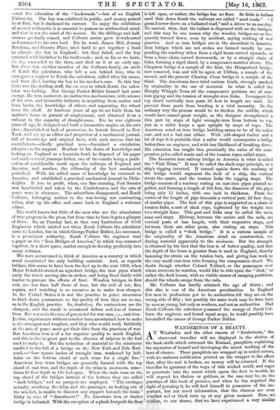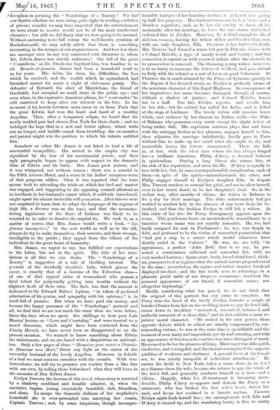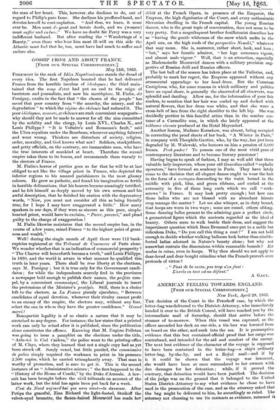WANDERINGS OF A BEAUTY.
AT Wiesbaden and the other resorts of " Roulettania," the observant traveller will see displayed in the shelves of the book-stalls which surround the Kursaal, pamphlets explaining the mysteries of hazard'and developing the secret working of the laws of chance. These pamphlets are wrapped up in sealed covers, with an ominous notification printed on the wrapper to the effect that, after the seal is broken, no money will be returned. If the traveller be ignorant of the ways of this wicked world, and eager to penetrate into the secret which opens the door to wealth, he will expend his thalers or guldens, as the case may be, on the purchase of this book of promise, and when he has acquired the right of perusing it, he will find himself in possession of the im- portant, but not novel information, that the chances are even whether red or black turn up at any given moment. Now, we confess, to our shame, that we have experienced a very similar
.v dece tion in perusing the Wanderings of a Beauty." We had ourfcloribts whether we were doing quite right in reading a relation of private scandal, we may have suspected that the entertainment we were about to receive would not be of the most intellectual character ; but still we did fancy that we were going to be amused. Without endorsing to its full extent the well-known cynicism of Rochefoucauld, we may safely admit that there is something interesting in the scrapes of our acquaintances. And how few there are amongst men in any way connected with literature to whom Mr. Edwin James was utterly unknown ? The fall of the great "C ausidicus," as Mr. Thackeray baptized him, was familiar to us all. Breach-of-promise James had been a household word to us for years. His debts, his duns, his difficulties, the fees which he received, and the wealth which he squandered, had furnished matter for many a night of club-room gossip. The defender of Bernard, the elect of Marylebone, the friend of Garibaldi, had occupied no small share in the public eye ; and even when, in the expressive American phrase, he "went under," he still contrived to keep alive our interest in his fate. In the moment of his lowest fortunes news came to us from Paris that the great Edwin had won the heart and hand of a wealthy Angelina. Then, after a temporary eclipse, we heard that the newly wedded pair had chosen New York for their abode ; and we indulged the hope that in a new and better sphere, where writs ran no longer, and bailiffs ceased from troubling, the ex-member and patriot might win the position to which his talents entitled him.
Somehow or other Mr. James is not fated to lead a life of uneventful tranquillity. His arrival in the empire city was signalized by the loss of his matrimonial jewels ; and then ugly paragraphs began to appear with respect to the domestic bliss of Edwin and his bride. Mrs. James grew jealous, and it was whispered, not without reason ; there was a scandal in the Fifth Avenue Hotel, and a scene in the ladies' reception-room of that gorgeous edifice. Then it was reported that the irate spouse took to attending the trials on which her lord and master was engaged, and suggesting to the opposing counsel allusions as to incidents in her husband's career which, if suddenly introduced, might upset his almost invincible self-possession. After this we were not surprised to learn that, to adopt the language of the regions of high life, a divorce was on the lapis, and that the accommo- dating legislature of the State of Indiana was likely to be resorted to in order to dissolve the nuptial tie. We took it, as a matter of course, that Mrs. James would write a book. "Les femmes incomprises," in the new world, as well as in the old, always do try to make themselves, their sorrows, and their wrongs, intelligible to the public ; they appeal from the villany of the individual to the great heart of humanity.
Mrs. James, we regret to say, has fulfilled our expectations in the letter, but not in the spirit. The title of her reve- lations is all that we can desire. The "Wanderings of a Beauty" is suggestive of a tale of thrilling interest. The portrait of the decidedly decollete'e lady, which graces the cover, is exactly that of a heroine of the Yelverton class— of one of that typical order of womanhood who possess a fatal talent for perpetually getting into trouble without the slightest fault of their own. The fact, too, that the memoir is dedicated to Sir Edward Bulwer Lytton, "in token of profound admiration of his genius, and sympathy with his opinions," is in itself full of promise. But when we have paid our money, and become the happy possessor of the "Wanderings," portrait and all, we find that we are not much the wiser than we were before. Since the days when we spent five shillings to hear poor Lola Montes' lecture on "Love and Courtship," and were treated to a moral discourse, which might have been extracted from the Family Herald, we have never been so disappointed as on the present occasion. We wanted to know something about Edwin the unfortunate, and we are bored with a disquisition on spiritual- ism. Only a few pages of these "Illemoires pour servo' a l'histoire de Monsieur mon. Mari," throw any light on the career of the unworthy husband of the lovely Angelina. However, in default of a loaf we must content ourselves with the crumbs. With true benevolence, we will try to preserve our readers from a like fate with our own, by telling them beforehand what they will learn in the memoirs of Mrs. Edwin James.
Evelyn Travers, the heroine of this novel, whose story is narrated by a shadowy confidant and humble admirer, is, when the narrative begins, young, exquisitely beautiful, rich, friendless, and alone. To escape the domestic dullness of her stepfather's household she is over-persuaded into marrying her cousin, Captain Travers ; and, by some iniquitous, though incompre-
hensible intrigue of her heartless mother, is jockeyed into giving up half her property. Her husband turns out to be a brute and a drunken reprobate, and, as he has the cruelty to shave off his moustache after his marriage, he loses the one charm which had endeared him to Evelyn. However, he is kind enough to die of delirium tremens, leaving his widow richer and lovelier than ever, with one only daughter, Ella. Previous to her husband's death, Mrs. Travers had formed a warm but purely Platonic liaison with a Colonel Melville, a type of manly worth and beauty ; and this connection is carried on with renewed. ardour after the obstacle to its prosecution is removed. The blooming young widow, however, is in no hurry to reassume the fetters of wedlock, and goes abroad to Italy with the colonel as a sort of lover on good behaviour. At Florence she is much admired by the Prince of Syracuse, greatly to the disgust of her devoted swain, as Evelyn is perfectly aware of the notorious character of His Royal Highness. In consequence of her imprudence her name becomes damaged, though, of course, without a shadow of justice ; and Colonel Melville leaves her in a huff. Too late Evelyn repents, and recalls him to her side ; but the colonel has sailed for India, and is killed at the siege of Lucknow. The lovely widow still remains heart whole, and enslaves by her charms an Italian noble—the Duke of Balsano, who pa.- eases every merit except the slight defect of being rather dull. His capricious mistress plays fast and loose with the unhappy Italian at her pleasure, engages herself to him, then adjourns the marriage indefinitely, finally goes to Paris without him to make up her mind what she ought to do, and
meanwhile leaves his letters unanswered. There she falls in, at last, with the ideal man whom she has always longed for—a brilliant American, Philip d'Arcy, a devoted believer in spiritualism. During a long illness she nurses him, at the risk of her reputation, and saves his life. D'Arcy is equally in love with her, but, by some incomprehensible complication, each of them—in spite of the spirits—misunderstands the other, and Philip engages himself to Evelyn's daughter Ella. In despair Mrs. Travers resolves to conceal her grief, and not to allow herself, even in her secret heart, to be her daughter's rival. So, in the coolest way, after months of silence, she writes to Balsano to fix a day for their marriage. The duke. unfortunately had got wedded to another lady in the absence of any news from his be- trothed, and thus the luckless Evelyn is still left a widow. At this crisis of her fate Sir Percy 111 ontgomery appears upon the scene. This gentleman bears an munistake,able resemblance to a barrister whose name was not equally romantic. He, too, had lately resigned his seat in Parliament ; he, too, was deeply in debt, and professed to be the victim of unmerited persecution that "had put a stop to a career which would otherwise have shortly ended in the Cabinet." He was, we are told, "in appearance, a perfect John Bull,' that is to say, he pos- sessed a countenance rubicund and somewhat flat, with no very marked features ; figure stout, burly, broad-shouldered, thick- set, you perceived at a glance that the animal nature preponderated in the man ; nevertheless, the square and rather massive forehead displayed intellect ; and the fine teeth, seen to advantage in a. pleasant jovial smile of not frequent occurrence, rendered the personal appearance of our friend, if somewhat coarse, not altogether impleasing."
Really, considering what has passed, we do not think that the original of this portrait has any cause to complain. Sir Percy wins the hand of the lovely Evelyn, borrows a couple of hundred francs from her on the wedding morn to pay his hotel bill, comes down to breakfast "unwashed, uncombed, unbraced, and perfectly innocent of a clean shirt," and in fact exhibits a most re- pulsive moral character. "lie united in his own person those opposite defects which in others are usually compensated by cor- responding virtues ; he was at the same time a spendthrift and the meanest of men, hasty and imprudent, yet sly and cunning, and with an appearance of frankness he combined an utter disregard of truth. He seemed to lie for the pleasure of lying. His temper was alike quick, vindictive, and revengeful, and his charaetercomprised the opposite qualities of weakness and obstinacy. A general lover of the female sex, he was utterly incapable of individual attachment." He carries his bride to New York, takes a room alone in an hetet at a distance from his Wife, because she refuses to pay the whole of the hotel bill, and generally conducts himself as a brute and a villain.. Happily, when hs ill-treatment is becoming unen- durable, Philip d'Arcy re-appears and detects Sir Percy as a miscreant, who has broken his first wife's heart, driven her mad, and keeps her confined- in a lunatic asylum. Thereon Evelyn again finds herself free ; the entanglement with Ella and D'Arcy is cleared up, and the wandering beauty is free to marry
the man of her heart. This, however, she declines to do, out of regard to Philip's pure fame. She declines his proffered hand, and devotes herself to contemplation. "And thus, we learn, it must ever be. Men must d) great and heroic deeds, and we (women) must suffer and endure." We have no doubt Sir Percy was a very indifferent husband. But after reading the "Wanderings of a Beauty," even those who bear him most ill-will on this side the Atlantic must feel that he, too, must have had much to suffer and endure also.
































 Previous page
Previous page